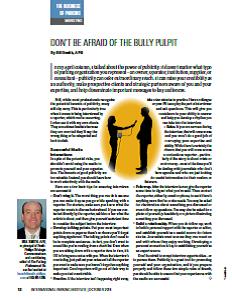In my April column, I talked about the power of publicity. It doesn’t matter what type of parking organization you represent—an owner, operator, institution, supplier, or consultant—publicity can offer extraordinary reach. It can raise your credibility as an authority, make prospective clients and strategic partners aware of you and your expertise, and help disseminate important messages to key audiences.
Still, while most professionals recognize the potential benefits of publicity, many still shy away. This is particularly true when it comes to being interviewed by a reporter, which can be unnerving. I often see it with my own clients. They sometimes hesitate because they are worried they’ll say the wrong thing or be misquoted and look foolish.
Successful Media Interactions
In spite of the potential risks, you shouldn’t avoid using the media to promote yourself and your organization. The benefits of good publicity are too valuable. Instead, you should learn how to work effectively with the media.
Here are a few basic tips for ensuring interviews are successful:
- Don’t wing it. The worst thing you can do is assume you can make it up as you go while speaking with a reporter. For starters, make sure you know what the reporter wants to discuss beforehand. If you are contacted directly by the reporter, ask him or her what the article is about, and then give yourself sufficient time to consider the subject before the interview.
- Develop talking points. Put your most important points down on paper so there’s no chance you’ll forget anything significant. The talking points don’t need to be in complete sentences—in fact, you don’t want to sound like you’re reading from a checklist. Even when you are sitting down with a reporter face-to-face, it’s ok to bring some notes with you. When the interview’s concluding, just pull out your notes and tell the reporter you want to make sure you haven’t forgotten anything important. Good reporters will go out of their way to make you feel comfortable.
- Practice. If the interview isn’t happening right away, take a few minutes to practice. Have a colleague or your PR team play the part of interviewer and ask questions. This will give you confidence in your ability to answer and help you develop a rhythm you can take into the interview.
- Relax. If you are nervous during the interview, that will come across and you won’t do a good job of conveying your expertise and ability. While there’s certainly the chance that you will come across a contentious reporter—particularly if the story is about crisis or controversy—most of the time you’ll be dealing with journalists who don’t have agendas and who are just looking for useful information for their readers or listeners.
- Follow up. After the interview is over, give the reporter some time to digest what you’ve said. Then contact the reporter, either by email or phone, to see if there’s anything more that he or she needs. You may be asked for clarification about something you discussed or even follow-up questions. You may also be asked for a photo of yourself (a headshot) or a picture illustrating something you discussed.
- Build a relationship. When you do follow up, work to build a personal rapport with the reporter or editor, and establish yourself as a useful source for future stories. Journalists want sources they can count on and with whom they enjoy working. Developing a personal connection is key to establishing yourself as an expert source.
Don’t be afraid to accept interview opportunities—or to pursue them. Publicity is a great tool for promoting yourself and your organization, and if you prepare properly and follow these few simple rules of thumb, you should be able to ensure that your experiences with the media are successful.
Bill Smith, APR, is principal of Smith-Phillips Strategic Communications and contributing editor of The Parking Professional. He can be reached at bsmith@smith-phillips.com or 603.491.4280.
TPP-2014-10-Don’t Be Afraid Of The Bully Pulpit

